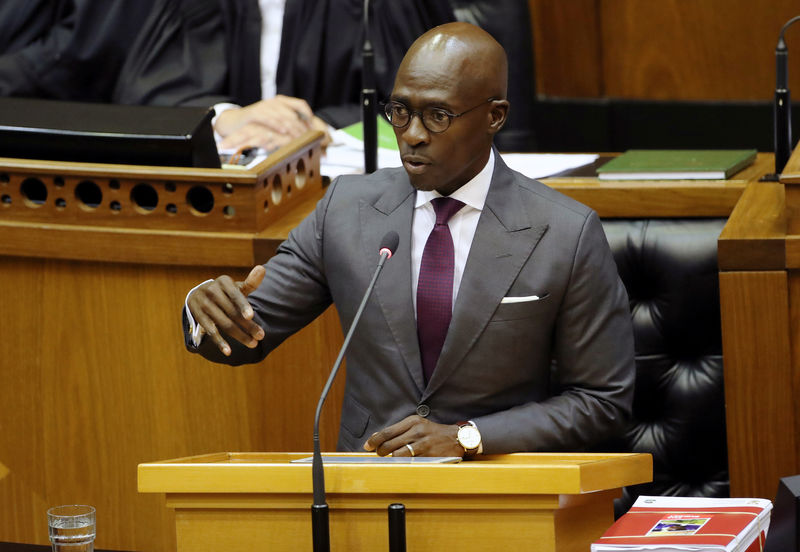 © Reuters. Finance Minister Malusi Gigaba delivers his budget address at Parliament in Cape Town
© Reuters. Finance Minister Malusi Gigaba delivers his budget address at Parliament in Cape TownBy Mfuneko Toyana and Marc Jones
CAPE TOWN/LONDON (Reuters) – South African bonds stayed in demand on Thursday as markets priced in expectations that government efforts to reduce the country’s large debt pile will enable it hang on to its last investment grade rating in a Moody’s review due soon.
In a budget announced on Wednesday, Africa’s most industrialized economy took the politically risky step of raising value added tax, a move likely to prove less popular with voters than with foreign investors.
Raising VAT for the first time in 25 years, along with a commitment to cutting debt, further burnished the market credentials of President Cyril Ramaphosa, who was elected a week ago.
S&P Global said the VAT measure was a welcome step.
“It is good to see that the debt trajectory is getting back on track,” Ravi Bhatia a director in S&P’s sovereign analyst group told Reuters. “…The question is around the implementation of consolidation and whether they can pull it off.”
The Director General of the National Treasury, Dondo Mogajane, said S&P, Fitch and Moody’s had in private all expressed their approval of the measure. “We engaged with (them)… Their preliminary view was that we did well,” he told a parliamentary committee.
Moody’s and Fitch told Reuters they treated all discussions with issuers as confidential.
S&P and Fitch cut their ratings on South Africa’s local debt to non-investment grade last year, as the economy and rand currency wilted after years of mismanagement under Ramaphosa’s scandal-tainted predecessor Jacob Zuma.
That left just Moody’s at investment grade, and that agency is preparing a review for possible downgrade it is due to publish on or before March 23.
‘OUT OF OPTIONS’
Economists have estimated that a third cut to ‘junk’ could trigger up to 100 billion rand ($8.5 billion) of investment outflows, but some said that was no longer the central scenario following Wednesday’s budget.
“I think it is fair to say the market is now pricing out a downgrade,” said fund manager UBP’s macro and FX EM strategist Koon Chow.
In a note, NKC African Economics analysts said they also believed Moody’s would not downgrade.
On Thursday, South Africa’s benchmark bond yield was trading at around 8 percent, close to three-year lows and down some 120 basis points since December.
South Africa’s rand
“We had run out of options,” he told a business breakfast in Cape town a day after tabling his maiden budget. He said poor households would be cushioned against the rise through a zero-rating of basic food items such as maize meal and beans, and welfare payment increases.
Mogajane said plans in the budget to bring gross debt down to 56 percent of domestic product by 2021, compared to over 60 percent estimated in October, were also welcomed by the agencies.
Fusion Media or anyone involved with Fusion Media will not accept any liability for loss or damage as a result of reliance on the information including data, quotes, charts and buy/sell signals contained within this website. Please be fully informed regarding the risks and costs associated with trading the financial markets, it is one of the riskiest investment forms possible.
Source: Investing.com




























